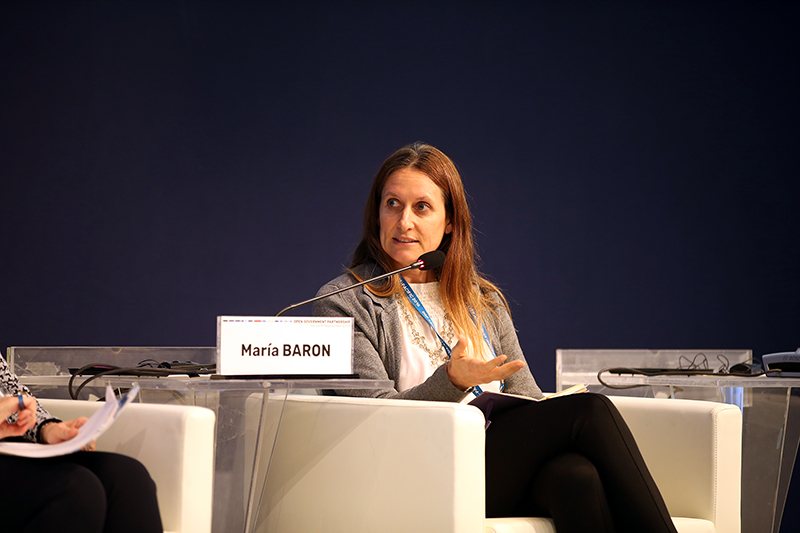An Eventful Year as Co-Chair

We share with you the words of our director María Baron on ending her term as co-chair of the Steering Committee of the Open Government Partnership (OGP).
Last year, when I heard I had been nominated to serve as lead civil society co-chair of OGP’s Steering Committee, I remember my initial pride and excitement giving way to some niggling doubts. How, I asked myself, with all the ideas I had for strengthening OGP’s direction (the best of them inspired from colleagues!) and with the need to keep delivering on the great vision laid down before me, would I have the time and wriggle room to really make a mark? And that is to say nothing about the pandemic and all its challenges.
Well, spool forward to the present, and while I will leave it to others to judge my mark-making, I hope I fared decently enough under the circumstances. Certainly it was a joy from start to finish. And now that I’m soon to pass on the baton, I thought it would be good to draw out a few highlights from my time in the role, to which I suspect I will look back fondly in years to come!
Let’s begin with the review of OGP’s Legislative Engagement Policy – an obvious enough starting point for anyone familiar with my pet interests. Coming into the co-chair role, I wanted to do all I could not just to expand the Partnership but to infuse it with fresh ideas and participants. And having a background in legislative affairs, there was little surprise I saw parliaments as central to this. Ahead of me, then, tasked as I now was with helping to overhaul the existing OGP guidelines for legislatures, was a golden chance to at once make it easier for parliaments to engage in OGP in future, and to do so a lot more broadly and ambitiously than before. I and others set about this revamp with relish. While the impact of the new policy, recently approved, remains to be seen, I am hopeful it will make a difference on both these counts.
Also special was being part of strengthening OGP as a bastion of civic space. (Sadly, there was ample opportunity for it to be one). With respect to El Salvador, in particular, and its shackling of non-governmental organizations (NGOs) all throughout 2021, it was striking how OGP and its allies reacted so nimbly to drum up resistance across sectors and borders. True, its statement of concern did not prompt a government u-turn. But, arguably more important, it helped make the world sit up and listen. And it gave vital grist to domestic civil society organizations (CSOs) and activists who are now clearly galvanizing against further encroachment.
Another highlight is the follow-up work on OGP’s global call to action. Here, we targeted six countries that we saw as especially ripe for or in need of a strong forward jolt on open government. Numerous calls and meetings were held with stakeholders from each. Out of this came, on the one hand, a set of individually adapted lobbying roadmaps offering more clarity on gaps and priorities, entry points, and objectives; and on the other, national CSOs far better equipped, cognizant and joined-up to engage and support the process. Looking back, the gains made in Kenya and Nigeria were especially key since, among other things, this valuable process allowed for more African actors to be drawn into the global openness fold.
So all in all, an eventful if blistering 12 months. Hugely personally enriching. And of benefit, too, I’d like to think, for OGP. Finally, my thanks to everyone in the Partnership for their unstinting patience and support, and to fellow co-chair the Government of South Korea. My successor, Aidan Eyakuze, will find no bigger ally than in that camaraderie.
